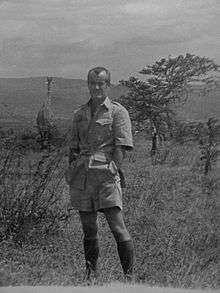Robert Conley (reporter)


Robert Conley (May 8, 1928 – November 16, 2013) was an American newspaper, television and radio reporter.
Overview
Conley was a foreign correspondent for The New York Times in the 1950s and 1960s,[1] bureau chief for NBC News, Africa, as well as foreign correspondent for NBC News' The Huntley-Brinkley Report throughout the 1960s,[2] editor for and contributor to National Geographic magazine in late 1960s to early 1970s,[3] and first host of the groundbreaking and popular Peabody Award winning National Public Radio (NPR) radio news and cultural program All Things Considered in the 1970s.[4][5]
Career
The New York Times
Before going overseas for The New York Times, Conley was first based in New York City, reporting on national events, often for the front page.[1] As major news events in Africa began to develop throughout the 1960s, The New York Times made Conley its foreign correspondent for Africa, based in Nairobi, Kenya.[1]
NBC News and The Huntley-Brinkley Report
In the mid 1960s, NBC News asked Conley on as bureau chief of its Africa bureau. From its base in Nairobi, Kenya, Conley travelled across the African continent covering events and filing stories for NBC News and its affiliated programs such as The Huntley-Brinkley Report.[2] Conley's news beat took him from Angola to Zanzibar,[2] a time when overseas news bureaus for the United States were not so ubiquitous as in later times.
NPR and All Things Considered
National Public Radio (NPR) was incorporated on February 26, 1970,[6] following the passage of the Public Broadcasting Act of 1967 (47 U.S.C. § 396) that established the Corporation for Public Broadcasting and also led to the creation of the Public Broadcasting Service (PBS).[7]
All Things Considered made its debut on May 3, 1971, broadcasting in 32 states, with Conley as host.[4][5] As described in an article by Hal Klopper for the Fall 2006 newsletter of the Carnegie Corporation of New York:[4]
The inaugural broadcast included a report on a 26-year-old woman’s attempts to deal with heroin addiction; a report from Ames, Iowa, on a novel means of supplementing business at a barbershop (shaving women’s legs); a discussion with two NPR reporters and a correspondent from the Christian Science Monitor regarding that day’s massive protest in Washington, D.C., against US involvement in the Vietnam War; the reading of three antiwar poems; and a conversation between the poet Allen Ginsberg and his father about the legality of drugs.
The show began, though, with a remarkable and dramatic 20-minute sound montage of the demonstration in Washington introduced by All Things Considered’s first host, former New York Times staff member and NBC correspondent Robert Conley.
Death
Conley died at age 85 from parotid cancer, in Virginia.[8]
References
- 1 2 3 "The New York Times Archives".
- 1 2 3 "NBC News Archives".
- ↑ Conley, Robert A.M. "Locusts: 'Teeth of the Wind.'" National Geographic Magazine, August 1969, pp. 202-26.
- 1 2 3 Klopper, Hal. "Soundscapes: The Evolution and Challenges of National Public Radio" (PDF). Carnegie Results (Fall 2006). Carnegie Corporation of New York. p. 6. Retrieved May 3, 2011.
- 1 2 "Happy 40th To All Things Considered". National Public Radio. 2011. Retrieved May 3, 2011.
- ↑ "NPR Overview and History". Npr.org. Retrieved 2012-04-24.
- ↑ The text of the PBA 1967 at cpb.org.
- ↑ Notice of death of Robert Conley
External links
- Segments from the inaugural broadcast of All Things Considered, and more on NPR's Happy 40th To All Things Considered.
